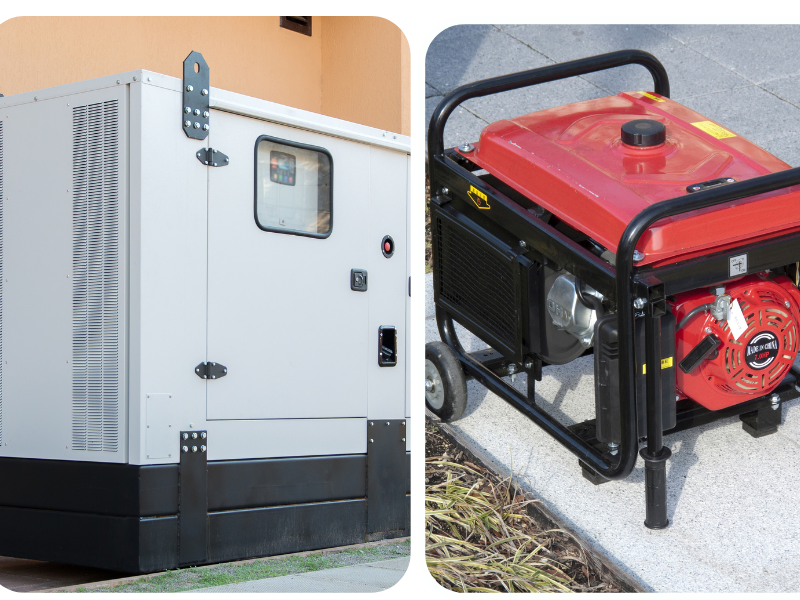
Investing in a backup power generator for your home is a great step to prepare for an outage. In the event of a major storm or other eventuality that results in a power outage, a backup generator can keep your lights and other essential equipment operable. If you are planning to invest in a backup generator, you will have to choose between a portable and a whole-house backup power generator. Apart from cost, there are other factors that you must keep in mind when making the decision. Here is a quick guide explaining the basic difference between portable and whole-house generators:
Whole house generator
A whole-house generator or a stationary generator is permanently installed outside your home. When your home loses its primary source of power due to an outage, the generator kicks in to supply your entire home with electricity. They normally run on propane, and some tap into a natural gas line. A whole house generator can power all of your home’s major appliances, including a refrigerator, HVAC system, water heater, garage door opener, and more. A whole house generator can be expensive depending on your home’s size and how many appliances you need to power up.
Portable generator
A portable generator is a diesel- or gas-powered device which provides power backup. The engine turns a small turbine, which in turn creates electricity up to a certain level of wattage. Portable generators can be easily stored in the garage or a shed. These generators can power a few lights, a refrigerator, or a TV. They cost much less compared to whole-house generators.
Whole house Vs. Portable generators
Power output
Portable generators are much smaller compared to whole-house generators. Whole house generators have much higher power ratings compared to portable generators. While portable generators can power only a few lights and possibly a couple of appliances, a whole-house generator can power all the electrical appliances in your house. Normally, the power output of a portable generator would lie between 1000-7500 watts, and that of a whole house generator could be as high as 25000 watts. When deciding between a portable and a whole-house generator, the most important factor to consider is the wattage you require.
Fuel requirements
Most portable generators are powered on gasoline, while others use propane and diesel. When you have a gasoline-powered portable backup generator, you must ensure that you have a sufficient quantity of fuel at hand to run the generator. However, local fire authorities may prohibit storing large quantities of gasoline in your home.
Standby generators run on propane or natural gas and connect directly to your home’s existing supply line. If you have a natural gas-powered whole-house generator, you will be able to run it for days without interruption. For a propane-powered generator, you will have to fill the propane tank by calling your local LPG company. Propane is a cleaner fuel compared to gasoline, and generators that run on propane are less expensive to maintain compared to the ones that run on gasoline. Whole house generators are more energy efficient compared to portable ones.
Price
A whole house generator can power your entire house, so you obviously need to pay more for this comfort. A portable generator can cost between $500-$2500 or more depending on the model and wattage, while a whole house generator can cost between $600-$20000. You also need to take into account the fact that whole-house generators last much longer and are more reliable compared to portable generators.
If you want to invest in a standby generator, get in touch with our team of experts, and we will help you choose the right one for your needs.
